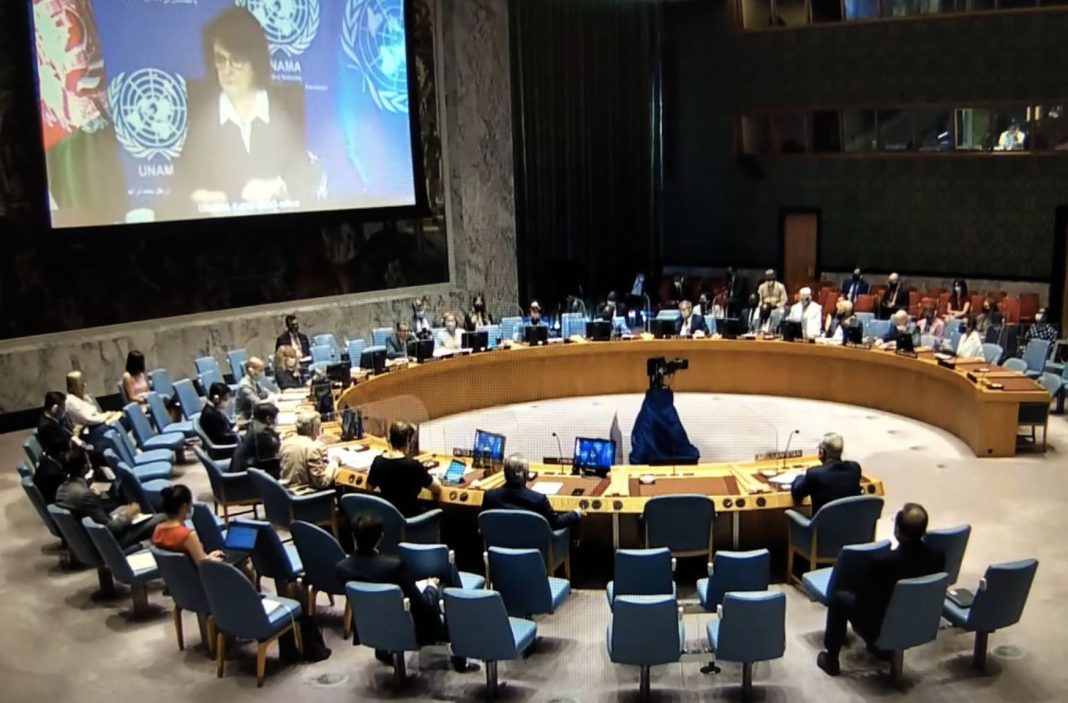By Janet Ekstract
UNITED NATIONS (TURKISH JOURNAL) – Ever since the U.S. and NATO troop withdrawal from Afghanistan, the country remained easy fodder for the Taliban. Analysts on the region sounded the alarm long before the current reality set in. As UN Special Representative to Afghanistan, Deborah Lyons reported, the situation has deteriorated to the point of almost no return. In addition, the UN Mission in Afghanistan in a statement, said there must be “an immediate end to all fighting in urban areas, saying that civilians are bearing the brunt of the violence.”
UN Secretary-General Spokesperson Stephane Dujarric, told the press on Tuesday that the Mission insists the fighting stop. The UN reported in Lashkar Gah that hospitals are flooding with increased civilian casualties as well as destruction and damage to civilian houses and essential infrastructure. Currently, Dujarric reported that UN partners in Afghanistan are evaluating needs and responding in the south of the country as much as is accessible. Dujarric added that on Sunday, the organizations reached more than 2,000 people in Kandahar with food, water, sanitation and monetary assistance. Dujarric stated that close to 360,000 people were forcibly displaced by the conflict in Afghanistan just in 2021 while at least 5 million have been displaced since 2012.
Meanwhile, on Friday, in a briefing at a UN Security Council meeting, Lyons warned that a new phase is taking place and that Afghanistan faces its most dangerous crisis. She commented: “Afghanistan is now at a dangerous turning point. Ahead lies either a genuine peace negotiation or a tragically intertwined set of crises: an increasingly brutal, conflict combined with an acute humanitarian situation and multiplying human rights abuses.”
Lyons requested the Security Council work to prevent Afghanistan from ending up in a tragic situation. She added that now the situation is “so serious that it would have few, if any, parallels in this century.” Lyons added: “And let me assure you, such a catastrophe would have consequences far beyond the borders of Afghanistan. I do believe that the Security Council and the broader international community can help prevent the most dire scenarios. But it will require acting in unity and acting quickly.”
The greatest danger is that in June and July, the Taliban waged a campaign to capture rural areas and so far, they have made major territorial gains. Lyons emphasized this gave the Taliban a stronger position to attack larger cities. She added that provincial capitals such as Kandahar, Herat and Helmand are under tremendous pressure which the UN envoy explained is part of the Taliban plan to grab major urban areas by force. She made it very clear that the situation for civilians is extremely critical while the political message the Taliban is sending is even more disturbing. Her remarks come on the heels of Friday’s Taliban capture of the city of Zaranj, the capital of Nimroz province on the border with Iran where all five districts are now under Taliban control. This is the first capture of a provincial capital by the Taliban since U.S. president Biden announced a complete withdrawal of American troops from Afghanistan. Hundreds have been forced to flee in search of safety. To date, at least 200 districts were seized by the Taliban.
UN Secretary-General Antonio Guterres urged parties to comply with international humanitarian law, and protect civilians, aid workers and civilian infrastructure, including schools and hospitals. Dujarric called on donors to urgently fund Afghanistan’s Humanitarian Response Plan. He said the plan includes humanitarians committed to staying and delivering assistance and they expect to reach half of close to16 million people who are targeted for assistance in 2021 despite worsening conditions. The plan requires $1.3 billion but only received $485 million so far. Dujarric pointed out that’s less than 50 percent funded. On August 7, the United Nations Children’s Fund (UNICEF) said it was outraged by a report that a 12-year-old boy from Shirin Tagab district in Faryab province was the victim of a brutal flogging by a member of an anti-government group. UNICEF reported the boy suffered severe injuries to his back, legs and feet – being traumatized by the horrendous attack. UNICEF and its local partners are providing urgent help to the child and his family that includes psychological support, medical care and other immediate needs.




